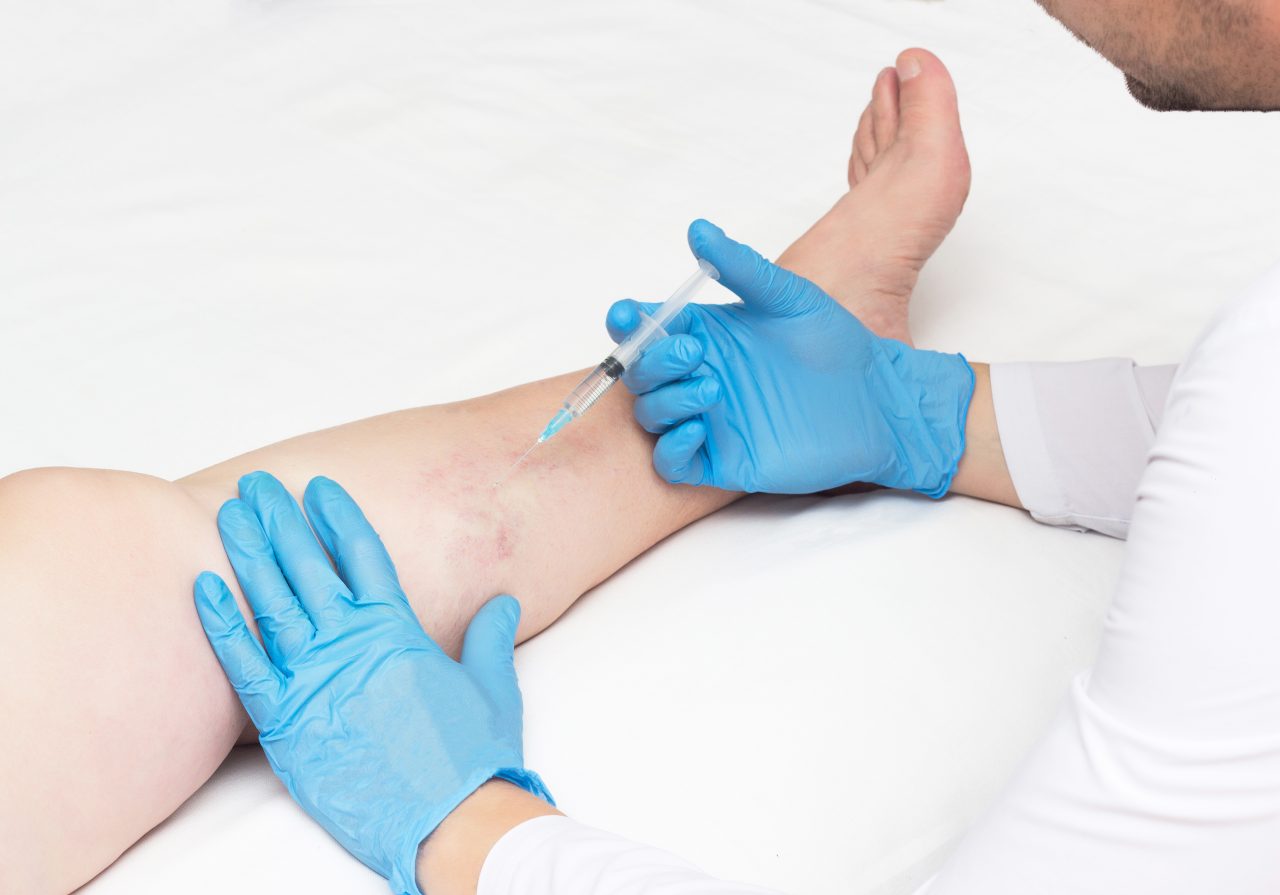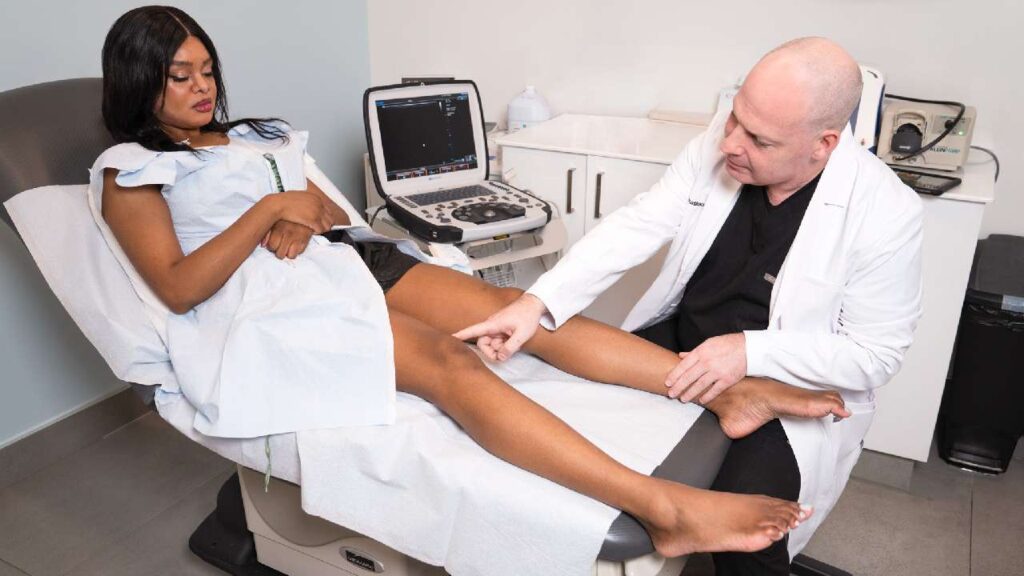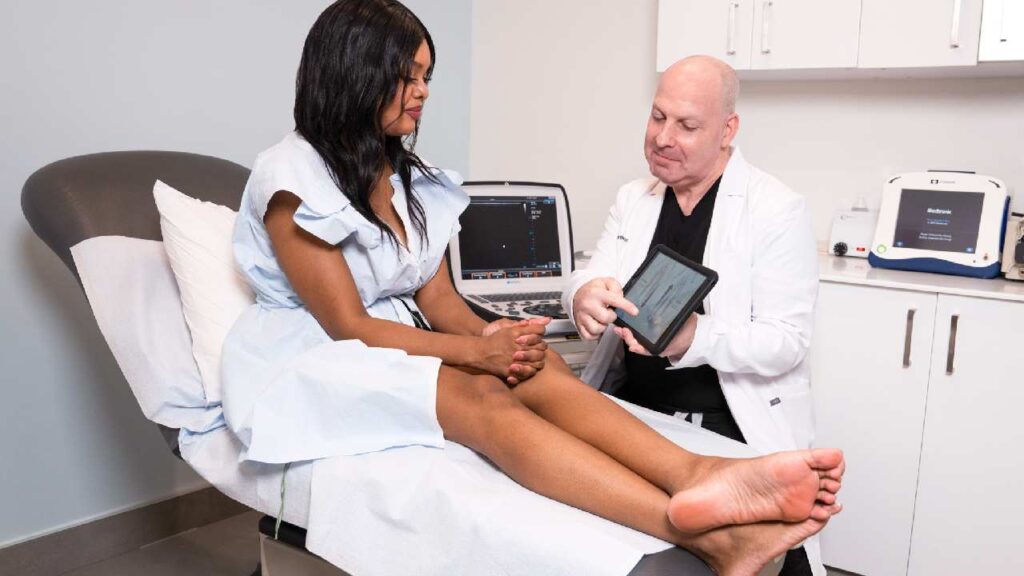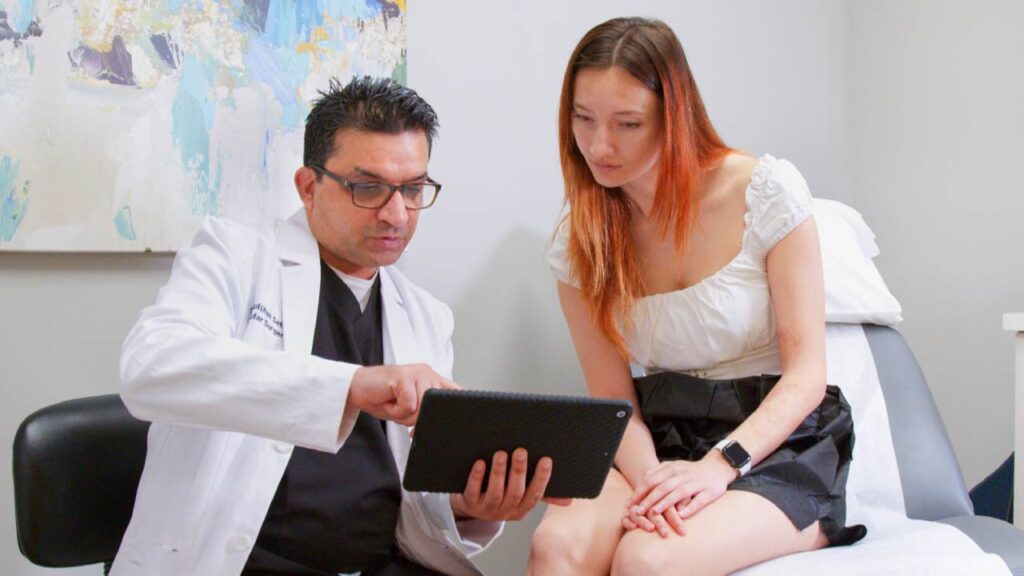Pathophysiology of Varicose Veins: 15 Defining Symptoms
Are you wondering whether those bulging, throbbing, enlarged veins in your leg are varicose? No two patients have identical symptoms, but here are 15 signs that you have a varicose vein. Which of the following best describes varicose veins? Numbers one through three are the hallmark symptoms, but the other symptoms are just as indicative of varicose vein disease. Book an appointment with Harvard-trained, minimally invasive vein doctors in NY to eliminate varicose veins and symptoms.
- Enlarged Veins: Varicose veins stretch to contain excess blood from valve failure.
- Tortuous Veins: Varicose veins twist and contort due to venous reflux.
- Protuberant Veins: As varicose veins expand, they protrude at the surface of the skin.
- Crampy Veins: Varicose veins cause cramping in the legs.
- Swelling Near Veins: Varicosities cause lower extremities to swell.
- Itchy Veins: Impaired circulation causes the skin above veins to itch.
- Colorful Veins: Varicose veins look bolder because they’re just beneath the skin.
- Heaviness: Venous reflux makes legs feel heavier throughout the day.
- Fatigue: Legs feel tired when you have varicose veins.
- Restless: Despite fatigue, venous insufficiency causes restlessness in legs.
- Venous Ulcerations: Varicose veins can develop slow-healing ulcerations.
- Venous Stasis Dermatitis: Venous eczema or dermatitis stem from varicose veins.
- Hyperpigmentation: Skin on the feet and legs can turn rust-colored with vein disease.
- Spider Veins Nearby: Spider veins near enlarged veins are a sign of varicosities.
- Blood Clots: Patients with blood clots often have engorged veins.

Do Varicose Veins Cause High Blood Pressure?
Did you think high blood pressure was one of the symptoms of varicose veins? Patients who are diagnosed with hypertension typically have high blood pressure in their arteries. These blood vessels have a different structure and function than veins. Leg veins pump blood to the heart from the feet. So, they are lined with valves that close once blood passes through, to keep it moving upward.
When vein valves fail, blood flows in reverse. This elevates pressure in the veins, not the arteries, and causes spider veins or varicose veins to form. Arteries do not have valves, and they do not become varicose. Varicose veins do not cause high blood pressure in the arteries. High blood pressure in the veins causes varicose veins.
Does High Blood Pressure Cause Varicose Veins?
Yes, high blood pressure causes varicose veins, but there is an important distinction to make. As mentioned, hypertension often refers to elevated pressure in the arteries. Arterial pressure is not the impetus for varicose veins. Hypertension in veins is what causes varicose veins, and that pressure is derived from venous reflux, when blood leaks backward through a faulty vein valve.
So, if you have high blood pressure or hypertension in your arteries, that’s a separate issue from the endovenous pressure that causes varicose veins. Since veins and arteries work in synchronicity to circulate blood, research is underway to determine the link between the two conditions.
Should I Get My Varicose Veins Treated?
The short answer is yes. You should get your varicose veins treated. Some varicose veins remain asymptomatic. But many patients develop some of the symptoms mentioned above. In addition, most varicose veins are caused by Chronic Venous Insufficiency, a disorder that produces more vein damage and symptoms over time. It’s impossible to see the impetus for your vein damage without ultrasound imaging, and varicose veins rarely improve without treatment.
Book a consultation to identify whether treatment is optional or mandatory for your varicose veins. Our caring vein specialists accept all major insurance carriers and don’t recommend treatments you don’t need. Our procedures are non-surgical and don’t involve general anesthesia or recovery time. So, book a quick assessment today for your peace of mind.
Are Varicose Veins Age Related?
Varicose veins and age are directly linked. While varicosities can form at any age, they are more prevalent as we age. Women are at increased risk, since hormonal shifts that occur during pregnancy, birth control use, and menopause contribute to varicose veins. People whose family members have varicose veins are also at increased risk, as are people with sedentary jobs or lifestyles.
Do Superficial Varicose Veins Always Require Treatment?
No, superficial varicose veins and spider veins don’t always require treatment, but many of them do. In addition, many patients choose optional treatments because they’re unhappy with how the varicose veins look. Our New York vein specialists offer a variety of gentle, outpatient procedures so you can have varicose veins treated during a lunch break! We’ll show you the full map of your veins plus we’ll explain why you do or don’t need vein treatment.
Are Varicose Leg or Chest Veins Life-Threatening?
Varicose leg or chest veins can become life-threatening. The three primary risks are a varicose vein with a blood clot that breaks loose and travels to the lungs (pulmonary embolism), a varicose vein that bleeds uncontrollably, or a varicosity with a venous ulcer that gets infected. From the surface, you can’t tell what’s causing the varicose vein or what complications lie in deeper veins. There’s no reason to delay varicose vein treatment. The solutions are safe, quick, gentle, and likely covered by insurance.
What Happens If Varicose Veins Are Left Untreated?
If varicose veins are left untreated, they can cause ulcers, profuse bleeding, dermatitis, blood clots, hyperpigmentation, and a host of uncomfortable symptoms like swollen, heavy, fatigued, restless, crampy, and itchy legs. Treating varicose veins is quick and effective, so visit our award-winning vein doctors in NY for fast relief.
Is a Varicose Veins Hard Lump a Treatment Risk?
There are very few risks associated with minimally invasive vein treatments. If you know people who had complications, ask them whether they had surgery or a minimally invasive procedure, and ask whether a board certified vein doctor conducted the treatment. The latest treatments are low-risk and widely considered safer and more effective than vein stripping surgery, if you choose a qualified vein specialist.
Which of the Following Best Describes Varicose Veins Relief?
Now you know which symptoms best describe varicose veins. But how about varicose vein relief? Our patients say they feel restored, renewed, younger, reinvigorated, confident, energized, relieved, re-engaged, and thrilled by their results. The feedback we get the most is that if they knew how quick, painless, and affordable treatment was, they would have done it much sooner. Now that you know, save your regret and book your varicose veins treatment today!





